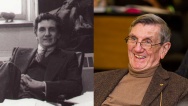Because I am a JD-Psychologist, each year, I teach a seminar that covers, in some form or another, “the psychology of the courtroom.” The course is a favorite of mine, both because it always draws an enthusiastic crowd of students, and also because it allows me free reign to talk at length about a subject that I usually only have time to briefly cover in my Torts and Criminal Procedure classes.
This semester, for the first time, I have decided to focus on persuasion. When my seminar has had a broader focus in the past, I have asked the students to think about policy questions and to ask themselves: Why is the law this way? Do laws and legal processes encourage the kinds of behavior we want to encourage? Could we, perhaps, be doing a better job? Persuasion can be a tricky topic for a law professor to teach because it inevitably leads down a shady path toward the strategic use of empirical findings to shape jurors’ attitudes. In the broader social policy arena, we talk about changing attitudes for the good of society—examples include persuading people to stop smoking or to vaccinate their children. In the context of the courtroom, let’s face it, we’re talking about strategically controlling the memories, perceptions, and emotions of members of the jury to achieve the desired verdict. I am bound by codes of professional ethics in both of my disciplines, but it is my responsibility to my students, and to their future professional integrity, that creates the most cognitive dissonance for me. So my class has gained an unintended ethical component, and I find myself asking: where is the line between effective lawyering and unscrupulous manipulation?
In my effort to get a sense for the views of others in the legal academy, I searched for articles related to the ethics of using empirically supported persuasive techniques in the courtroom. What I found was, well, almost nothing. This is interesting in and of itself. Why is so little written about the ethics of manipulating a jury? Is the reason for this because we all assume that every lawyer may—and perhaps should—use every tactic at his disposal, short of violating rule of professional conduct? As a practical matter, trials are adversarial battlegrounds, where some rules may be followed less strictly than others. For example, my sense is that MRPC 3.4 (e) prohibiting a trial attorney from alluding “to any matter that the lawyer does not reasonably believe is relevant or that will not be supported by admissible evidence” and from stating “a personal opinion as to the justness of a cause, the credibility of a witness, the culpability of a civil litigant or the guilt or innocence of an accused” is probably flexed more than some other rules.
I had trial tactics on my mind when I walked into the other course I’m teaching this semester, Criminal Procedure, Adjudication last evening. I showed the students a film called “Gideon’s Trumpet,” which tells the story of Clarence Earl Gideon (played by Henry Fonda), who famously petitioned the Supreme Court from a Florida Prison, contesting the constitutionality of a trial without legal representation. The resulting case, Gideon v. Wainwright, gave every indigent criminal defendant the right to counsel. The movie depicts two trials. The first showcases Gideon’s monumental failure, as he attempts to represent himself. The second occurs after he gains the right to be represented by local counsel. The stark contrast between the trials is one of the most poignant and powerful reminders of the importance of a skilled trial attorney in shaping verdicts. The rhetoric, intonation, and body language of Gideon’s lawyer, and the way he reframes the narrative, turning the prosecution’s eye witness into a credible suspect, is a perfect example of how psychological tactics can operate in a courtroom. Of course, this is Hollywood, but the result was still compelling.
Here are a few thoughtful pieces on this general subject:
The Arts of Persuasion in Science and Law: Conflicting Norms in the Courtroom
Through a Glass Darkly: Using Brain Science and Visual Rhetoric to Gain a Professional Perspective on Visual Advocacy



